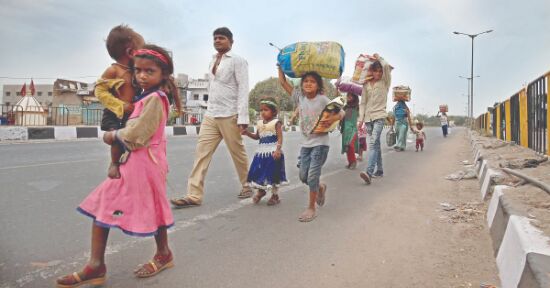Prayas
Relentless in its endeavour to provide succour to crisis-hit destitute people, the organisation continues to grow in collaboration with various players

When I took over as Secretary of School Education and Literacy under the Government of India in 2016, I discovered that the government alone could not solve the problems that afflicted the social sector. During my travel to 24 states, I also got to know about the wonderful work being done by several civil society organisations in the field of school education. One such amazing organisation was "Prayas". True to its name, this organisation was making remarkable efforts to alleviate the misery faced by destitute children.
Born out of a crisis in June 1988, when a major fire destroyed hundreds of 'jhuggis' in Jahangirpuri slums leaving behind a trail of destruction and scores of orphaned children, Prayas has learnt to relish every crisis in the last 32 years of its existence.
Amod K Kanth, a highly decorated former DGP of Arunachal Pradesh and DCP for Crime in Delhi, was posted in Delhi when the fire broke out. Like many other officers, he also visited the site of the fire as part of his duty but the images of destitute and orphaned children touched him deeply. The consequence was the birth of Prayas in a one-room setup in Jahangirpuri with the help of some selfless friends from the Delhi Police and the Delhi School of Social Work.
Beginning with 25 children, today Prayas has footprints across nine states and UTs including Delhi, Bihar, Assam, Arunachal Pradesh, Andaman and Nicobar Island, Jharkhand and Kashmir. Presently, it serves 50,000 beneficiaries including women, urban homeless and marginalized youth with its committed team of more than 700 professionals. The team comprises social-workers, child psychologist, medical professionals, teachers/educators, welfare officers and hundreds of volunteers and interns.
One theme that runs all across the journey of Prayas has been its response to crisis. Whether it was the earthquake of Gujarat in January 2001, the tsunami in Andaman and Nicobar Islands in 2004, the floods in Bihar or the earthquake in India and Nepal in 2016, Prayas has jumped in to galvanise its resources to reach out to affected persons to alleviate their sufferings with special focus on children and women who are always the worst sufferers in such situations.
The COVID-19 pandemic is impacting thousands of children and migrant men and women. The Prayas team was again on the ground, among the people who needed help and succour. The team worked relentlessly to strengthen the efforts of the government and the civil society by ensuring the availability of cooked food and dry rations to a large number of stranded workers and their families that could not reach their destination (especially to contractual labourers, daily wage workers, rickshaw pullers, construction workers, street vendors, manual scavengers, brick kiln workers, workers at small repair shops, roadside eatery workers, security guards etc). On average, Prayas Team reached out to more than 4,000 people every day by serving them hot cooked food.
The 24×7 Childline 1098 of Prayas is functional at six locations, namely, New Delhi Railway Station, Janhagirpuri, Bawana (Delhi), Raxaul and Samastipur (Bihar) and Andaman and Nicobar Islands, supporting the distressed children along with their families during the COVID-19 pandemic and lockdown.
Very recently, in Rajasthan, the Prayas team partnered with an agency of the Rajasthan government to train 100 beggars to transform their destiny to look the world in their face. These beggars have been selected for vocational training and skilling so that they can support their families and bring them out of their misery. Divided into five groups called T-20 BHOR Teams, they are being trained for different vocations. In association with Dr Niraj K Pawan, Principal Secretary of Labour, Skilling and Rehabilitation, the programme is now seeking to be scaled in the entire state of Rajasthan to make the state "BhikhariMukt". This programme reflects the working style of Prayas that has focused on a public-private partnership to scale good practices since its formation in 1988 to bring about permanent changes in the demography of the country.
Prayas also runs the Rape Crisis Intervention Centre, now known as One-Stop Crisis Centre to help the victims of sexual assault, particularly minor girls. It was launched by the then Minister of State for Social Justice Maneka Gandhi, with Delhi Chief Minister, Sahib Singh Verma in attendance in January 2000.
A large number of other programmes are also being implemented in collaboration with the government and private institutions. These include the Jan Shikshan Sansthan under the Ministry of Skill Development and Entrepreneurship since 2000, DUSIB, Asian Foundation, Freedom Fund, Adoption Centrum, NSDC, Coca-Cola, National Scheduled Caste Financial Development Corporation, National Backward Class Financial Development Corporation, Schneider Electric India Foundation Ltd, BC Jindal Electrician and Plumbing Training Programme and the Tata Power Delhi Development (TPDDL) project.
Prayas is also partnering with various government agencies and making efforts in the formulation of policies, strategies and approaches to alleviate the miseries pertaining to deprived sections of the society. It had an important role to play in the formulation of the Tenth Plan, in the re-enactment and implementation of Juvenile Justice (Care and Protection of Children) Act, 2000, National Policy and Charter for Children and National Commission for Protection of Children Rights.
The story of Prayas would be incomplete without mentioning its collaboration with the NITI Aayog. NITI Aayog's document titled '3-year Action Agenda' was a result of an exhaustive consultative process that took inputs from Prayas and 19 other leading service delivery NGOs.
Prayas is undoubtedly a remarkable effort spearheaded by a former Police Officer with a big heart. It presents a wonderful example of Nexus of Good wherein an approach to resolving issues relating to destitutes has not only been tested and proved but also scaled through public-private partnerships. The key to success has been the vision of its founder Amod Kanth's meticulous planning, exemplary team-work and commitment to a social cause.
Views expressed are personal



